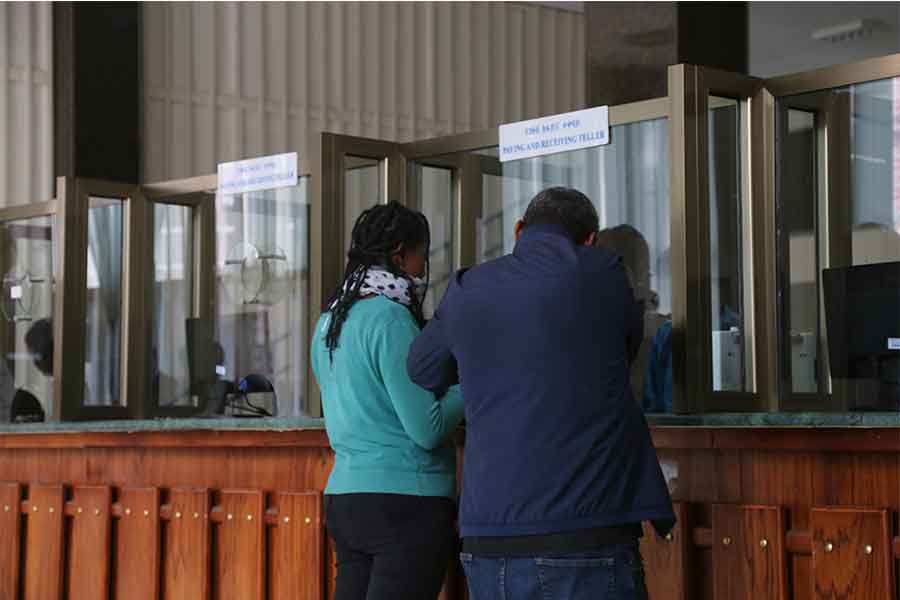
Radar | Sep 29,2024
Sep 19 , 2020
By GELILA SAMUEL ( FORTUNE STAFF WRITER
)
The government has started crafting a directive that compels public offices to fully digitise their services within a year. The directive follows the e-transaction proclamation that was legislated four months ago to govern electronic government services and the buying and selling of goods and services via the internet.
The Ministry of Innovation & Technology is drafting the directive to provide guidelines for public offices for providing their services digitally. Handled by the Policy & Architectural Unit at the Ministry, the directive is expected to be approved before January.
The directive sets out the preconditions public offices have to fulfill before launching any service digitally. It focuses on the design of the telecom infrastructure, organisational structure, data centre availability for the service and the quality of the data centre. Upon the approval of the directive, all public offices are required to fully automate their services in a year.
Websites and other infrastructure for public offices to provide e-services will be developed by the Ministry. All of the systems have to be accessible in every language so that all users are able to use it, according to the directive.
Users who do not have access to the internet can use access centres yet to be organised by the government offices, according to the draft directive.
Out of the total services provided by public offices, 175 of them are planned to be under e-gov. So far, 70 services that are provided by 10 public offices are operational. However, these services do not include a digital payment transaction option.
Also, any services that are forthcoming at the public offices have to be fully digital by design, according to Abiyot Bayou (PhD), director of the Digital Transformation Programme at the Ministry.
After the legislation of the e-transaction proclamation, the Ministry drafted e-transaction regulations that outline the details of government e-commerce. The regulation introduces digital receipts, as well as information and user reviews on products and services on platforms.
Even with the addition of the system, what matters is the availability and being able to access the system, according to Abiyot.
"People have to be able to trust the system," he said. "It's only right to take into account all user statuses."
As a pilot project, the Ministry of Transport has started an electronic service for renewals. Launched early this year, the service has reached close to seven telecentres.
One of the challenges is currently when data is processed through a third party, there should be data policy to administer this, according to Abiyot.
The Ministry has drafted a Personal Data Protection Proclamation that pivots on how consumer or user data is utilised and protected. Also, it affects how data is processed. The bill was sent to the Office of the Attorney-General for legal review.
"Also, without waiting for the digital ID, we're developing makeshift temporary solutions to confirm identification to provide these services," he added.
Two of the proposed solutions are using mobile phones as identification and also, as a last resort, having customers physically visit offices.
This is definitely going to be a game changer for how public services are governed, which is often criticised for being bureaucratic and complicated, according to Tedrows Tassew, a fintech expert for over a decade.
"More than the legal framework, the systems have to be easy to navigate so that any person with any background can be able to access them," he said. "Also, these systems have to be clear about their procedures, and nothing works without well-functioning internet."
PUBLISHED ON
Sep 19,2020 [ VOL
21 , NO
1064]

Radar | Sep 29,2024

My Opinion | May 25,2019

Fortune News | Apr 12,2020

Life Matters | Sep 06,2020

Radar | Aug 30,2025

Featured | Jul 13,2019

View From Arada | Dec 24,2022

Fortune News | Apr 03,2023

Featured | Nov 13,2021

Fortune News | Jun 20,2020

Dec 22 , 2024 . By TIZITA SHEWAFERAW
Charged with transforming colossal state-owned enterprises into modern and competitiv...

Aug 18 , 2024 . By AKSAH ITALO
Although predictable Yonas Zerihun's job in the ride-hailing service is not immune to...

Jul 28 , 2024 . By TIZITA SHEWAFERAW
Unhabitual, perhaps too many, Samuel Gebreyohannes, 38, used to occasionally enjoy a couple of beers at breakfast. However, he recently swit...

Jul 13 , 2024 . By AKSAH ITALO
Investors who rely on tractors, trucks, and field vehicles for commuting, transporting commodities, and f...

Oct 11 , 2025
Ladislas Farago, a roving Associated Press (AP) correspondent, arrived in Ethiopia in...

Oct 4 , 2025
Eyob Tekalegn (PhD) had been in the Governor's chair for only weeks when, on Septembe...

Sep 27 , 2025
Four years into an experiment with “shock therapy” in education, the national moo...

Sep 20 , 2025
Getachew Reda's return to the national stage was always going to stir attention. Once...